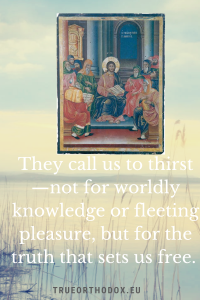Homily 5 on Genesis and Gathering Spiritual Riches by St. John Chrysostom

FIFTH HOMILY.
God says, “Let the waters under heaven gather together in one place, and let the arid appear. (Gen, I, 9.)
1. Sacred Scripture is a rich and precious gold mine, and the treasures we draw from it are not exposed, like those of the earth, to the rapacity of thieves. But we must preserve them from the attacks of the evil spirit who would like to rob them. 2. We are on the land of travelers who amass provisions to return to their homeland; and these provisions, which will open the entrance to heaven, are alms and penance. A truly Christian life gives the just a sweet confidence to appear before the supreme judge, and it is a reproach to the wicked. of their vices, and an exhortation to virtue. 3. This long exordium leads the orator to explain the ninth verse of Genesis; and he says that God would only name the arid element, earth, and the union of waters, sea, after having cleared one of the waves of the abyss, and united the others in the place which was destined for them. – 4. With these other words: “Let the earth produce the green plants with their seeds,” he observes, just as the earth was then covered, without the help of man or animals, of harvests and fruits, even today it draws its fruitfulness far more from this order of the Lord than from our labors. He also refutes those who attribute this fertility to the influence of the stars. 5. He remarks that Moses often repeats these expressions: “and in the evening and in the morning laughs first, second, and third day,” so that we may better understand the order and distribution of time. 6. He ends with an exhortation to despise human glory.
1. Even today, the words of Moses will provide me with the spiritual feast that I want to serve your charity, by carefully explaining to you the work of the Lord on the third day of creation. Those who work in the mines do not stop, when they have encountered a rich vein, to dig deeply; they remove all obstacles, and fear not to descend into the bowels of the earth to remove as much as possible from this precious metal. And we, who do not seek gold veins, but an ineffable treasure, must we not continue our daily work to return to our homes with hands full of spiritual riches. Too often the goods of the earth become for their possessors the cause of great misfortunes; and, after a few moments of rapid enjoyment, they are robbed of them by the fraud of flatterers, the violence of thieves, or the cunning of slaves, who flee loaded with precious booty. But no loss of this kind threatens our spiritual riches; this treasure can not be stolen from us, and as soon as we hide it in our heart, it is safe from all rapine: it is enough that our cowardice does not give entry to the enemy, who wishes only to we strip. And indeed, when this enemy, this demon, I mean, sees that we are rich in the goods of grace, he shudders with rage, grinds his teeth, and watches attentively the favorable occasion to take away our riches. Now, the time which is most favorable to him is the one where he surprises us cowardly and careless; that is why we need to watch constantly to thwart all its pitfalls. For if he attacks once or twice those he finds active and vigilant, he soon leaves them in peace, ashamed to see his efforts useless, and assured that he will not win the victory as long as we stand on our guards. But since we are not ignorant of the fact that life is a continual struggle, let us always be armed as in the presence of an enemy who is constantly watching us, and fear that the slightest negligence on our part will not facilitate the opportunity to surprise us. .
See how carefully rich people look after their affairs, as soon as the approach of the enemy is announced: some have their locks and locks to better protect their money, and others bury it under (25) earth, so that no one knows where he is hidden. It is. as to their example we must preserve the treasure of our virtues and hide it from all eyes, enclosing it in the secret of our heart; it is thus that we must repulse the attacks of those who would like to rob us of it, so that, preserving it from every destructive hand, we use it as a useful viaticum for the journey of eternity. Those who live in a foreign country and want to see their homeland, take care long in advance to gather little by little as much money as they need to be enough along the way and not to expose themselves to starve. This conduct must also be ours, for we are on the land of strangers and travelers. So let us take care to gather and store abundant provisions, so that at the moment when the Lord will order us to return to our homeland, we are ready to leave, taking with us some of our wealth and having already sent the other in front of us. For such is the nature of this viaticum: it is permissible for us to be preceded by a multitude of good works; and these, by anticipating us, will open to us the doors of a just confidence to appear before God, will facilitate the access of his throne, and allow us to approach without fear a Judge whose benevolence they have reconciled to us.
2. But to convince you, my dear brethren, of the certainty of this doctrine, it suffices for me to remind you that at the end of this world, the Christian who has largely dispensed alms and led a pure life, will find mercy near of the supreme judge, and will hear with all the elect these consoling words: Come, the blessed of my Father; possess the kingdom prepared for you from the beginning of the world: for I was hungry, and you gave me food. It is the same with other virtues, the confession of sins, and diligence with prayer. And indeed, when during life we took care to erase our sins by confession, and we were able to obtain pardon from God, we leave the earth clean of all defilement, and we appear before the Lord full of complete confidence; but those who have neglected to use the present time to expiate their sins will find no consolation after death. For, Lord, says the Psalmist, who will confess your name in the sepulcher? (Ps. VI, 6.) Word is very true, since life is the time of struggle, of war, of fighting, and eternity is that of crowns, prizes, and rewards. Thus, let us fight generously while we are still in the career, lest in the light of the crowns and rewards, we be among those who share only shame and confusion. May we, on the contrary, mingle with the elect who will present themselves with confidence to be crowned!
It is not without reason that I speak to you thus, my beloved ones; and I hope that my words will not be useless. Yes, I want every day to warn you to multiply your good works, so that you will appear in the eyes of all, consumed in perfection, and adorned with all the virtues. Children of God, blameless, pure and immaculate, then you will shine in the world like stars, and having the word of life, you will one day be our glory before Christ. And yet your presence alone has already been a salutary warning to your brethren, and the perfume of your virtues, no less than your wise conversations, have drawn them to imitate your good examples. For if the wicked harm one another by their mutual relations, according to this word of St. Paul: bad conversations corrupt good morals (I Corinthians XV, 33); it is no less true that the society of good people is of great help to those who cultivate it. It is therefore from kindness that God permits the mixing of the good and the wicked, that they may profit from the examples of these, and do not always remain in their iniquity. And indeed because they constantly have beautiful models of virtue under their eyes, it is impossible for them not to profit by them. For such is the power of virtue, that even those who do not practice it, can not refuse them their respects and their homage. The wicked, on the contrary, disapprove of vice and condemn it, and you will find almost none who glory in being vicious. But what is even more surprising is that their words wither their own conduct, and that they seek darkness to commit evil. For man brings to the bottom of his conscience, and by an effect of divine mercy, (26) an incorruptible discernment which makes him distinguish evil from good. So we are absolutely inexcusable, since we do not sin by ignorance, but by laziness and contempt for virtue.
3. If these truths are present to us at every hour of the day, we will work our salvation with great solicitude, and we shall fear, as a real pity for our souls, to allow time to pass uselessly. But let us end this long exordium, and listen, please, what today the Holy Spirit wants to teach us through the mouth of the holy prophet Moses. And God said, Let the waters under the heaven be gathered together in one place, and let the arid appear. And it was done so. Consider here, my dear brothers, the order and the continuation of the divine covers. Moses had told us from the beginning that the earth was invisible and unformed because it was covered with darkness and water. Therefore in the second day, God separated the waters by the firmament which he called heaven, and in the third, he commanded that the waters which were under heaven, that is to say, the firmament, should gather in one place so that their retirement would leave the land uncovered. And this was so. It was because the waters covered the whole surface of the earth that the Lord commanded them to gather in one place, and then the arid could show itself. See how the sacred historian is gradually discovering the beauty of the universe! And it was done so, he says. How? According to the Lord’s orders. He says, and nature obeys suddenly. For it belongs to God to regulate all creatures according to his will.
And the waters that were under heaven were gathered together in their pools, and the arid appeared. Moses had already said in speaking of the light that God created it when darkness covered all nature, and that separating it from the light he had assigned it to day, and darkness to night; and here he also says that God, after having created the firmament, placed above him a portion of the waters, and established the others below. He then adds that (command of the Lord these gathered in one place so that the arid element appeared.) Then God gave a name to the arid element, as he for the light and the darkness, the waters that were under heaven, saith the scripture, were gathered together in one place, and the arid appeared, and God called the arid earth, so, my dear brothers, how God tore the veil that made the earth invisible and unformed, for it was covered by the waters, as by thick darkness, but as soon as it could show its face, it gave it a name.
And God called the meeting of waters, sea. The waters, therefore, have their name; and the Lord, like the potter who fashioned a vase, and gave him a name only after having finished it, would not impose a name upon the elements until he had distributed them in the places he assigned to them. The land, therefore, received its name as soon as it appeared in the form it was to take; and likewise, the waters received a special denomination. For God, says the Scripture, called the meeting of waters, sea; and he saw that it was good. It is because man is too weak to praise the divine covers with dignity, which Scripture warns us, and teaches us that the Lord has praised them himself.
4. Thus, when you learn that the Creator has found his creatures good, you must admire them supremely, but you can add nothing to the praises they have already received; for such is the power of God, and such is the perfection of his works, that we can not praise them as much as they deserve. But is it any wonder that the weak and ignorant man can never praiseworthily nor celebrate the works of the Lord? The rest of the story also shows us the ineffable wisdom of the divine Worker. He has just discovered the surface of the earth and hastens to embellish it; so we see that at his word, plants and flowers enamel their rich varieties. And God said, Let the earth produce the green plants with their seed, and the trees with fruit, which every one according to his kind, contain within themselves their seed, to reproduce themselves on the earth. And it was done so. What do these last words mean: “And it was done so? They tell us that, at the Lord’s command, the earth hastened to pour out its productions and to hatch the germ of all plants. So the earth produced, said Moses, plants which bore their seed according to their kind, and fruit trees which contained their seed in themselves, each according to its kind. And who would not admire here, my dear brother, how the divine word has done everything on earth? And indeed, there was no man yet who cultivated it and who, to cover it with furrows, bent the ox at the yoke of the plow; but she heard the commandment of the Lord, and suddenly produced plants and trees. From which we learn that even today, it is far less the care, the labors and the plowing of the plowman that fertilize the earth than the orders which the Lord intimated to him from the beginning.
Moreover, the Scripture, to render beforehand the ingratitude of men truly inexcusable, reveals to us carefully the order and continuation of the works of creation. It wants to suppress the temerity and extravagance of those who give us their dreams for realities, and who argue that the cooperation of the sun was necessary for the production of plants and fruits. Others attribute these effects to the influence of the stars; but the Holy Spirit teaches us that, long before the creation of the sun and the stars, the earth, obedient to the divine word, had, without any foreign concurrence, produced of itself plants and trees; it was enough for him to hear this saying: Let the earth produce lush plants. Let us then follow the footsteps of Holy Scripture, and highly condemn those who rise up against his divine teachings. Although men cultivate the land, and with the help of domestic animals, they apply to agriculture; although the seasons are favorable to them, and all things concur in satisfying their desires, if God does not spread his blessing, they will exhaust themselves in useless labors. Yes, neither the sweat nor the labor of the plowman becomes fruitful if the Lord, from heaven, extends his hand and gives them a happy increase. But who would be delighted with astonishment and admiration at seeing how this word: Let the earth produce verdant plants, penetrate into the depths of the earth and adorn it like a rich carpet by the variety of flowers that covered the surface. Thus the earth, which had formerly been raw and uneducated, suddenly clothed itself with a brilliant adornment, and rivaled beauty with the firmament. And indeed, just as this one was soon to shine forth from the fire of the stars, the earth was embellished by the variety of flowers; so that the Creator himself praised his own work. And God, says the Scripture, saw that it was good.
5. Moses takes care, as you may notice, to remind us, after each of the works of creation, that God praises His own work, in order to teach men to go up from the creature to the Creator. For if creatures are above all our praises, what of the Divine Worker who produced them? And God saw that it was good, and evening and morning was the third day. It is to better inculcate these things, that the sacred writer repeats them here. It was enough for him to state that the third day was done; but he uses the same terms he has already used, and he tells us that evening and morning was the third day. Of course, it is not from his forgetfulness or inadvertence; he wants us not to confuse the order of things and not to see the approach of the night as the end of the day; for the evening is only the end of the light and the beginning of the night, just as the morning is the end of the night and the complement of the day. This is what the holy prophet Moses teaches us when he says to us: And in the evening and in the morning was the third day. And do not be astonished, my dear brother, that the Holy Scriptures so often repeat the same things; for, in spite of his care and his precautions, some Jews persist in their error, and maintain, with the obstinacy of a blind mind, that the evening is the beginning of the next day. They deceive themselves and are still seated in darkness, though the truth has been revealed to all eyes. They still seek the light, when the Sun of righteousness has risen on the world. But after Moses has informed us of all these details with such exactness, who could bear the obstinacy of these unruly spirits!
Their malice will receive its just punishment; but we, who have been enlightened by the rays of the Sun of righteousness, are submissive and docile to the teachings of Holy Scripture. By following this rule, we will keep in the secret of our heart a pure and orthodox faith, and we will do our utmost to preserve it. We will also work zealously in the work of our salvation, and we will flee as a deadly poison whatever could hurt the holiness of our soul; for the loss of sanctifying grace is so much greater that the soul prevails over the body. Poison can kill only the body, while error brings eternal death to the soul. And what are these poisons so dangerous? The number is great (28) and varied, but the most fatal is the one that inclines us to love vain glory and prevents us from despising it; for this sin brings with it a thousand disorders: it dissipates the spiritual riches that we have been able to accumulate and robs us of all the profit that we could derive from them. Is it a more dangerous evil, since it even robs us of the goods we believe to possess? And is it not so that the Pharisee was put down below the publican? (Luke, xviii.) He could not control his tongue, and, by praising himself, he threw all his riches out of the window, so vainglory is a deadly poison!
6. But, I ask you, why do you so eagerly seek human glory? Do you not know that the praises of men are less than a shadow and that they dissipate like a light vapor? Add, further, that such is the inconstancy and mobility of man that he is not slow in censuring the man whom he once showered with praise. But nothing like that is to be feared by God. Let us not be so foolish as to seduce ourselves; for if in the practice of good works our intention does not relate only to God and the observance of His law, and if we seek to be known to anyone other than Him alone, we lose the fruit of our troubles and we deprive ourselves of the benefits we could derive from it. And indeed, he who does good to capture the esteem of men, what does he gain, whether he succeeds or fails in his projects? Often human glory escapes us, even when we do everything to acquire it; and always, whether we succeed in obtaining it, or it escapes us, we receive our reward here below so that we can not hope for that of heaven. Why? Because the one who prefers the present in the future, and the praise of men to the approval of the righteous Judge, makes himself unworthy of being honored by this judge. If, on the contrary, we practice virtue to please only the God whose eye never closes, and before whom everything is bare and uncovered, our treasure will be safe and our spiritual riches will be preserved intact. Moreover, the assurance that these riches can not be taken away from us will provide us with a sweet consolation, and we shall not be deprived of the esteem of men.
And, in fact, we enjoy it with a plenitude all the greater as we despise it, that we do not seek it, and that we do not desire it. And is it any wonder that such is the conduct of a Christian philosopher, since we see the enthusiastic supporters of the world, despising themselves those who most aspire to the glory of the world. Yes, you will always find that those who seem too greedy for honors attract only contempt. What a misfortune, then, would not be ours, if we, who make profession of religion and piety, desire like them the praises of men, and if it was not enough for us to obtain the approbation of God, following the example of the Apostle, who drew his glory not from men, but from God! (Rom. II, 29.) Have you not observed, my dear brother, that those who dispute the prices of the hippodrome pay no attention to the shouts, nor to the favor of the people who applaud them? It is because they see only the prince who presides over the races and that they are entirely preoccupied with the desire to please him. So, disdaining the vain suffrages of the multitude, they are drunk with happiness when they receive from his hands the price and the crown. Imitate them, and do not regard the applause of men as highly worthy: do not seek them in the practice of virtue, but wait for the judgment of the righteous Judge, and be careful only to obey him. . In a word, regulate so much your life, that already you have in hope those eternal goods that give us to acquire the grace and the mercy of Our Lord Jesus Christ, to be with the Father and the Holy Spirit glory, honor, and empire, now and forever and ever. So be it.




